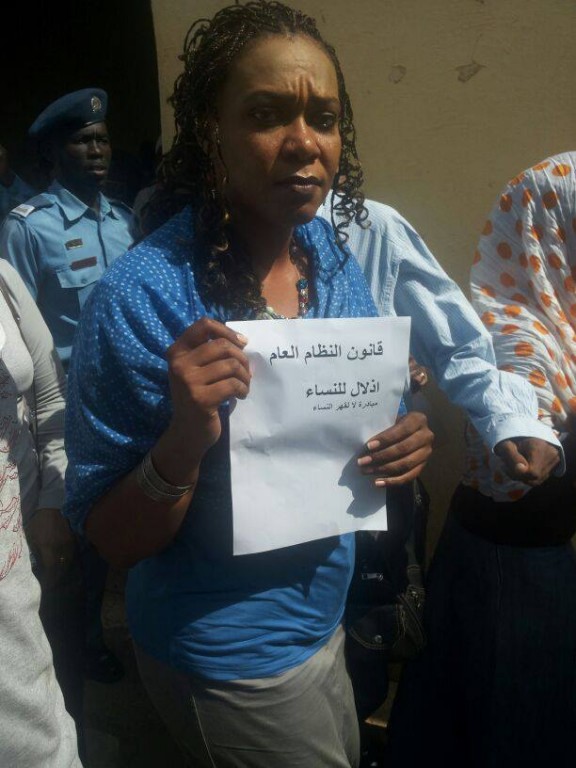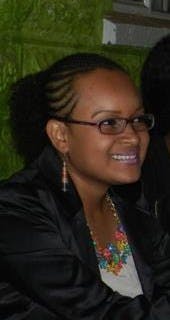Politics of Oppression in the State of Shariaa
Jan 21, 2015
Story

Ameera Osman is a Sudanese activist who was arrested, under article 152 of the criminal code “indecent clothes,” on August 27, 2013 for uncovering her hair. She refused the summary trial and insisted on having a lawyer. She has chosen to speak up and invited people to attend her trial on September 1, 2013. She came to the court in the same clothes as those in which she was arrested and found about a hundred supporters, males and females, waiting with her while the judge didn’t show up.
A few weeks ago Noor Elhadi, a Sheikh and traditional therapist who was convicted of raping a female student and sentenced to 10 years in prison and 100 lashes has been released on a presidential decree. He has never been lashed, and only imprisoned for a year. In Islam, Allah forgives all the sins but not those include grievances and violations of people’s rights. Albashir, the head of the Islamic state, has granted himself the right of forgiveness over people’s grievances. In a speech that he made last month, he admitted being responsible for the Muslims being killed in Darfur and followed his admission with holding himself accountable only to Allah, as the sins of killing souls is not punishable in life.
In 1989, the National Islamic Front came into power with a military coup. Their Islamic ideology was interpreted in “Modernization Project” which aims to reform the Sudanese people and make them “more Muslim”. This project focused on enforcing certain standards of morality those are directly connected to controlling women’s bodies and behavior through legally punishing their violations, setting them as a condition of being a true Muslim and socially through desensitizing the society to oppression under Manhood and Islamism slogans.
Hijab has been imposed on Sudanese women for the past 24 years. Ameera’s conviction of indecency for not covering her hair is punishable by flogging, bailing or imprisonment. The indecency is defined by the police officers who check women’s clothes randomly in the streets to see whether they are wearing tight jeans, midi skirt, and short sleeved shirts, or simply not putting their scarves on. Every year thousands of women are being arrested, compromised, jailed and flogged for their dress code. Accusations of prostitution are made by existing in a “prostitution place” which could be a car, an office or a classroom, or even a dark street. Few of those women go public like Ameera and speak about what they have been through, fearing the social stigma of being immoral and less Muslim.
The interpretation of Hijab in Quran differs widely between sects. While Suna Wahabist think the whole veil and covering the face is a must, many sects stick to only exposing the hands and face and others see it’s not a part of Islam but the Arabic culture. Fourteen centuries ago; during prophet Muhamed era and in the Bedouin community of Arabian Peninsula, no single woman was punished for not wearing Hijab. For sure NIF is not trying to make Sudan a more Muslim society than that of prophet Muhamed, but trying to present oppression of women as having divine authority. Although Shiaa sect is labeled as polytheist and non Muslims by our “Muslim” government, banned from conducting any activity in Sudan (This depends on how our diplomacy with Iran and Saudi Arabia looks like.), and verbally insulted during Friday speeches; judges found no clue to pass two stoning sentences last year based on Yazidi Gafary doctrine that allows stoning of women for committing adultery without accusing a male partner. Its seems that our government searched for the most oppressive Fatwa even if they had a huge dispute with its source.
I’m convinced that what’s happening in Sudan has nothing to do with Islam but instead with the politics of oppression. As a Muslim woman, I hope to be seeing Muslims, men and women, rising up against the violations made in the name of their religion. Principally our existence in this country isn’t because of being Muslims but citizens who need to enjoy their personal freedoms and rights. Religion is a personal belief -- not a state affair and a tool of injustice that humiliate human beings.
This article is part of a writing assignment for http://www.worldpulse.com/pulsewire/programs/world-pulse-voices-of-our-f...">Voices of Our Future a program of World Pulse that provides rigorous digital empowerment and citizen journalism training for grassroots women leaders. World Pulse lifts and unites the voices of women from some of the most unheard regions of the world.




